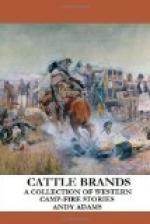A few minutes later Happy Jack took his place on the rim of the rock to make a dive, his magnificent physique of six feet and two hundred pounds looming up like a Numidian cavalryman, when Dad observed, “How comes it, Jack, that you are so pitted in the face and neck with pox-marks, and there’s none on your body?”
“Just because they come that way, I reckon,” was the answer vouchsafed. “You may think I’m funning, lads, but I never felt so supremely happy in all my life as when I got well of the smallpox. I had one hundred and ninety dollars in my pocket when I took down with them, and only had eight left when I got up and was able to go to work.” Here, as he poised on tiptoe, with his hands gracefully arched over his head for a dive, he was arrested in the movement by a comment of one of the boys, to the effect that he “couldn’t see anything in that to make a man so supremely happy.”
He turned his head halfway round at the speaker, and never losing his poise, remarked, “Well, but you must recollect that there was five of us taken down at the same time, and the other four died,” and he made a graceful spring, boring a hole in the water, which seethed around him, arising a moment later throwing water like a porpoise, as though he wouldn’t exchange his position in life, humble as it was, with any one of a thousand dead heroes.
After an hour in the water and a critical examination of all the old gun-shot wounds of our whole squad, and the consequent verdict that it was simply impossible to kill a man, we returned to camp and began getting supper. There was no stomach so sensitive amongst us that it couldn’t assimilate bacon, beans, and black coffee.
When we had done justice to the supper, the twilight hours of the evening were spent in making camp snug for the night. Every horse or mule was either picketed or hobbled. Every man washed his saddle blankets, as the long continuous ride had made them rancid with sweat. The night air was so dry and warm that they would even dry at night. There was the usual target practice and the never-ending cleaning of firearms. As night settled over the camp, everything was in order. The blankets were spread, and smoking and yarning occupied the time until sleep claimed us.
“Talking about the tight places,” said Orchard, “in which a man often finds himself in this service, reminds me of a funny experience which I once had, out on the head-waters of the Brazos. I’ve smelt powder at short range, and I’m willing to admit there’s nothing fascinating in it. But this time I got buffaloed by a bear.
“There are a great many brakes on the head of the Brazos, and in them grow cedar thickets. I forget now what the duty was that we were there on, but there were about twenty of us in the detachment at the time. One morning, shortly after daybreak, another lad and myself walked out to unhobble some extra horses which we had with us. The horses had strayed nearly a mile from camp, and when we found them they were cutting up as if they had been eating loco weed for a month. When we came up to them, we saw that they were scared. These horses couldn’t talk, but they told us that just over the hill was something they were afraid of.




